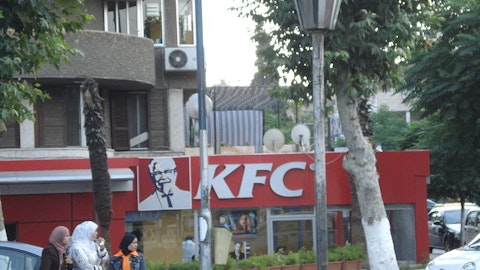We’ve been at north of 50% of all of our stores around the globe as part of a loyalty program, and that is continuing to grow. We’ve now implemented in the Middle East. KFC US is coming on later this year, and we continue to refine the way our loyalty programs work. You mentioned Taco Bell. They are now starting to really leverage the insights that we’ve generated from the early days of that program to refine the program over time. And we’ve implemented the Red 360, which is the first time we’re bringing together insights across our brands in the US. So that will be a driver of Taco Bell growth. More broadly, on the strategy, as you mentioned, category entry points or use occasions is a big focus. We think there’s a massive opportunity at lunch.
We continue to focus on breakfast. You’ve probably seen the ads recently during sporting events. So all of those are part of the bright future ahead for Taco Bell.
Operator: Our next question comes from Andrew Charles of TD Cowen. Please go ahead. Your line is now open.
Andrew Charles: Great. Thanks. Another Taco Bell question. Obviously, very encouraging 3Q performance and commentary about the start of 4Q. I was hoping you could elaborate on the Cantina menu coming in 2024. I recall this menu item driving success in 2012, but was more upscale compared to US consumer that you guys noted is increasingly seeking value today. So, can you help just us better understand the difference between the upcoming menu versus the one launched a decade ago?
David Gibbs: Sure. Look, I think one thing Taco Bell does incredibly well in the industry is constantly change and evolve to consumers taste. I wouldn’t draw an exact parallel to the past Cantina menu. This is more about the chicken Cantina menu or Cantina chicken in terms of what that protein can do for us and launching a different version of our chicken. So I think the team’s excited about the impact they can have. But there’s lots of reasons to be excited about what Taco Bell is doing in 2024. As Chris mentioned, all the impact that the tech can have, the insights we’re going to glean from data. Taco Tuesday, now that we’ve established that in the way that we can leverage that going forward. The momentum we’re getting in breakfast, what we can do with loyalty.
The business is, obviously, somewhat on a roll. If you look at the results from the last quarter, and I mentioned those trends are continuing. And so much of that gets right back to the great talent that we have at Taco Bell. Sean Tresvant is taking over and he’s got a great team in place and if you’ve seen the actual detailed plans for next year, you’d be as excited as I am. I obviously, not going to share a lot of the proprietary stuff. But things line up well for a strong 2024 for Taco Bell.
Operator: The next question comes from Brian Mullan of Piper Sandler. Please go ahead. Your line is open.
Brian Mullan: Hi. Thanks. Another one on Taco Bell, but this one is just specific to the international business. At the Investor Day last year, you shared a goal to get to 2,500 locations as quickly as you can. Related to that, as we look out over the next year, what kind of annual case do you think you can get to from a gross openings perspective? And then if you could just comment on the opportunity for Taco Bell in China, specifically, may be your level of optimism there, that would be great to hear your current thinking.
David Gibbs: Yes. Obviously, Taco Bell International is an exciting part of the growth equation for Yum!. We don’t provide brand-by-brand development targets, and so we’re not going to waver from that. But you know our overall development goals are incredibly ambitious, opening up a new unit every other hour around the world. And as you can see from this quarter that we set a record on development this quarter. As far as Taco Bell in the various markets around the world. Yes, I just got back from a trip to Spain, where I spent some time with our great franchisee in Spain, one of the early adopters of Taco Bell that got to scale quicker than other mark. And you can see, he’s done an amazing job of building a moat around the business and creating a differentiated brand much like in the US and now they’re reaping the benefits from that and have very aggressive expansion.
But when any time you’re taking a brand global that’s been traditionally a US brand, you’re going to — it’s not going to be an even path all the way to the top. There’s going to be ups and downs, some market take off, other markets take a pause. So I think in aggregate, we’re very excited about the opportunity for Taco Bell around the world. We think it can be a meaningful growth driver in our equation long term. But we’re going to make sure that everywhere we go, we’re helping our franchisees build the brand the right way, take whatever time that takes, like we did in Spain and the UK to establish the brand in a way that ensures its long-term success.
Operator: Our next question comes from Jon Tower of Citi. Please go ahead.
Jon Tower: Great. Thanks for taking the question. Just curious, either David or Chris, perhaps you could shed some light on what you think could happen with the NLRB recent joint employer ruling? It’s set to go into effect on 12/26 of this year. And curious to know what your thoughts are, whether or not it does go into effect and how it might impact the relationship between franchisee-franchisor in the US over time and potential impacts on your own P&L?
David Gibbs: Yes. Sure. Yes. Look, I’d start big picture. We’ve been navigating regulatory environments in 160 countries around the world, and they’re always constantly changing. And certainly, the NLRB recent ruling and whether or not that goes into effect, it will have an impact on us. But it’s nothing that I don’t think we can — we’ll have trouble navigating in the long term. Look, I’ve seen our business grow around the United States. I’ve known — a lot of our franchisees are good friends of mine for decades. I’ve seen them start as team members and grow to become successful small business people. And I do think the franchising model is one that’s great for our country. It’s living the American dream. It’s good for the communities that we serve.
And we oppose anything that threatens that model, and I know that there is opposition to that ruling in terms of whether it will actually take effect at the end of the year. But it’s really less of an issue for Yum!, if you think about the landscape that we operate in. Our franchisees tend to be much larger. We tend to run more of a decentralized model globally and even in the US because our franchisees have a lot more capability. So I have no doubt that whatever the rules are that we have to operate by, we will be able to, as we’ve proven all around the world over many, many decades. But this one, obviously, in the short term is something we oppose and we’ll have to see how it plays out.
Operator: Our next question today is from Dennis Geiger of UBS. Please go ahead.
Dennis Geiger: Great. Thank you. Wondering if you could comment a little bit more on both KFC and Pizza Hut in the US. Solid gains in general over the years from the work the teams have done. But wondering if you could just frame up how to think about how the brands are positioned in the US right now within their respective categories? And where they can go given some of the opportunities that you’ve highlighted. Thank you.




